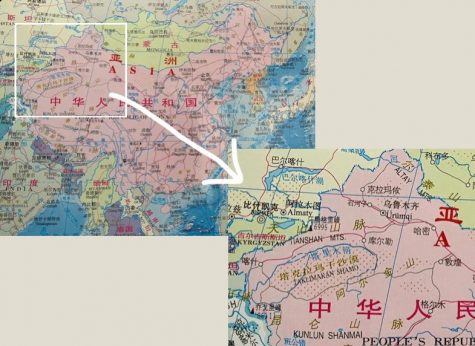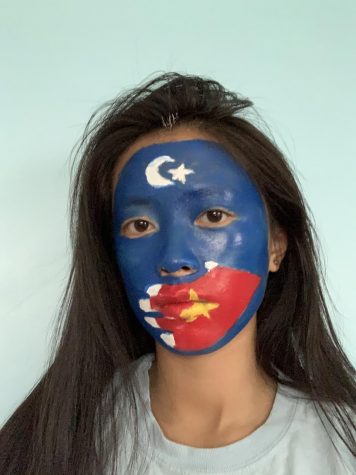Uyghurs aren’t “Chinese” Enough
In the city of Xinjiang, Uyghurs, a Muslim minority group, are reportedly contained in re-education camps. It is believed the Chinese Government is worried about the minority’s potential Islamic extremism. The Chinese Communist Party (CCP) have been accused of forced sterilization of women, separation of families, and forced labor.
ORIGIN OF CAMPS
Xinjiang is a Chinese autonomous region where most of the Uyghurs’ population live. The Uyghurs wish to be independent, but the Chinese Government disagrees. Instead, the Chinese Government wants to unify all their territories. Since China is so vast, it would be difficult for the government to manage everyone. “Chinese government basically wants to be in control of everybody’s speech, their behaviors, where they go, what they say, everything,” said Daisy Laone, the AP Chinese teacher at Hall High School.

With 11 million Uyghurs in Xinjiang, the extermination of whom isn’t considered a Han (the majority ethnicity in China), set forth an increase of these re-education camps from 279 to more than 380. Since 2017, more than 85 camps were identified to detained more than 1 million Uyghurs and other Muslim groups. The State Department confirmed that “two million more must undergo re-education training every day.”
Ömir, a survivor of these camps, testified to Varsity what he had experienced. Policemen showed up at his doorstep, bound him with iron shackles and beat him. They tortured him with needles in his fingers and nails, violated his sexual organs with iron sticks, and secured him in the infamous “‘Tiger Chair.’”
Behind the forbidden fences, the prisoners are shackled 24 hours a day. They’re always hunched down in a submissive position due to the 10kg block chained around their necks.
They don’t do much other than convert. They sing songs that “praise Chinese Communist Party, stress China’s greatness, and show gratitude towards President Xi Jinping,” Ömir explained. They are warned of the 48 characteristics deemed as a threat, such as growing a beard or praying. In addition, they’re forbidden to speak their own dialect because of China’s language policy: everyone will speak and learn Mandarin.
(“The issue is that they are starting to lose the dialect that they spoke,” said Jerry Zhu, a teacher assistant for Daisy Laone. “So maybe in a few generations later, [their] dialect may not exist anymore. Nobody is going to speak it.” )
COTTON PICKING
In March, global brands like Nike, H&M, and Adidas announced they would no longer buy cotton from Xinjiang, which produces ⅕ of the world’s cotton. There have been speculations that forced labor is being used in the cotton factories, but the Chinese Government denies all allegations “the factories are part of a massive, and voluntary, ‘poverty alleviation’ scheme,’ according to BBC. However, in December 2020, through an investigation, the BBC found half a million forced laborers. Many of these cotton factories are built inside the concentration camps. A young Uyghur boy, currently living in Europe, talked about what he last heard about his family.
Although Ömir didn’t mention more, there have been speculations that forced labor is being used in the cotton factories, but the Chinese Government denies all allegations. They said “the factories are part of a massive, and voluntary, ‘poverty alleviation scheme ,” according to BBC. However, in December 2020, through an investigation, the BBC found half a million forced laborers. Many of these cotton factories are built inside the concentration camps.
“‘In winter, my mother was picking cotton for government officials – they say they need five or ten percent of the village, they come to every family door by door,” said a young Uyghur boy who’s currently living in Europe. He added, “‘people go because they’re afraid of being taken to jail or somewhere else.’”
Global brands like Nike, H&M, and Adidas announced in March 2021 that they will no longer buy cotton from Xinjiang, which produces ⅕ of the world’s cotton.
STERILIZATION
Along with the concentration camps and cotton labor, the medical professionals forcibly sterilize women to prevent reproduction, and policemen sexually assault them. From 2014 to 2018, the number of IUDs inserted jumped from 200,000 to 330,000. From one testimony of a female victim, these IUDs can be harmful if not taken care of. An IUD can sink into their flesh and cause an infection. If they were found pregnant, the medics would perform a forced abortion. The reminder of IUDs violating their free will, ingrained the fear of giving birth.
China’s obsession with eugenics has proven to be successful. From 2015 to 2018, birth rates of Uyghur’s region plunged more than 60% in Hotan and Kashgar, and 24% in Xinjiang, compared to the national average of 4.2%. The disparity is too grand to ignore the label: genocide.
GENOCIDE
When students learn about genocide, they always ask: Why? Why does genocide continue to happen? How do we prevent it? These questions were more or less answered with the help of Amanda Beaulieu, a History teacher, and Lara White, a psychology teacher at Hall High.
There are multiple reasons why genocide continues to happen. Beaulieu speculates it has something to do with nationalism “and the targeting of the other ‘group’ that doesn’t fit the National or cultural identity.” Territorial claim could also be a reason, with the desire to expand into other regions, as well as “attacking the group of people living there in order to dominate.”
The term genocide is still considered recent. In 1940, the defintion was made by the genocide conventions when the council investigated the genocide of Myanmar and Rohingya.
It isn’t just a genocide of their religion and race, it’s their culture too. They’re forcing them to “change the way they go about their lives” to be more ‘Chinese’.There is violence, forced sterilization, and brutality with the active denial of the Chinese government.
It’s hard to intervene, especially when the country is in the security council or on the human rights council. Another factor is alliance or economics. This causes them to “only intervene when it’s convenient, or when there will be reciprocation of benefit.”

While there have been attacks done by Uyghurs, it’s still essential to know genocide is still genocide. Regardless of the justification, they are still victims of the typical scapegoat.
In 2009, a rumor circulated that a Han Chinese woman was sexually assaulted by Uyghur workers, which led the other Uyghur workers to be beaten, leading to two deaths.This raised a riot which resulted in 197 people killed and 1,700 injured.
Using these violent incidents, they condemn the group by using it to justify themselves. This is part of the classification stage: the us and them mentality.
Another reason why genocide keeps happening is because, genocide can happen quickly. For example, Rwanda has over a million people killed in a few months compared to the Holocaust, which took longer. Regardless, the UN has a “enforcement problem.”
“They don’t know how to effectively enforce or step into an issue to prevent genocide. Partly because of their own issues within their organization and largely because of the interest of the countries that would have to step in.” Unfortunately, Beaulieu speculated the United States isn’t going to step in.
Luckily, Lara White brought some positivity to this bleak situation. This mentality is “easy…to unteach it,” because the idea of racism is based on the “need for society and culture.” It’s not “biologically based,” instead “it’s going to be reinforced by behavior,…usually operant conditioning, a little bit of classical conditioning…to get these ideas ingrained in their head.”







